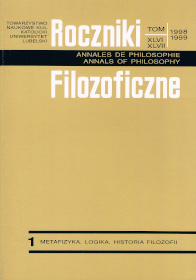Reprezentacja wiedzy negatywnej przy opracowaniu komputerowym fragmentu Pisma świętego
Abstrakt
The paper concerns the problem of representation of negative knowledge (i.e. knowledge that some facts do not hold) obtained from a text in a natural language. The text from the Bible was chosen, because it is rich and diverse in its contents and formally disordered. Thus, methods developed for that text can be broadly applied to other domains. More specifically we consider the genealogy of people occurring in the chosen fragment in the text. We notice that the family relations between them hold in some situations, in other situations do not hold and in still others the text contains no information about them. The distinction between the last two cases is particularly interesting.
The presented method of knowledge representation, which is the main result of the paper, is based on the technique of axiomatic rejection created by Aristotle. A program is extended by a set of rejected formulae. Then, during a query answering procedure, the query is added to the database and we try to derive a rejected formula in the database modified in such a way. If we succeed, the negative answer for the original query is given. The details of the implementation of this procedure in Prolog are presented. Furthermore some related works, other solutions to the problem and open questions are mentioned.
Copyright (c) 1999 Roczniki Filozoficzne

Utwór dostępny jest na licencji Creative Commons Uznanie autorstwa – Użycie niekomercyjne – Bez utworów zależnych 4.0 Międzynarodowe.





